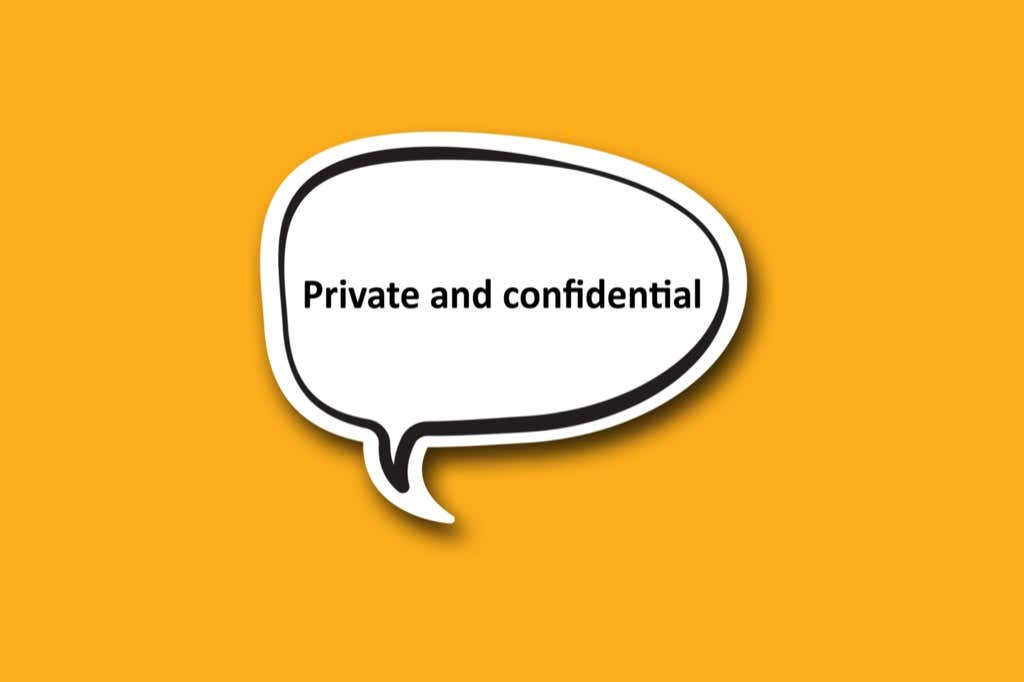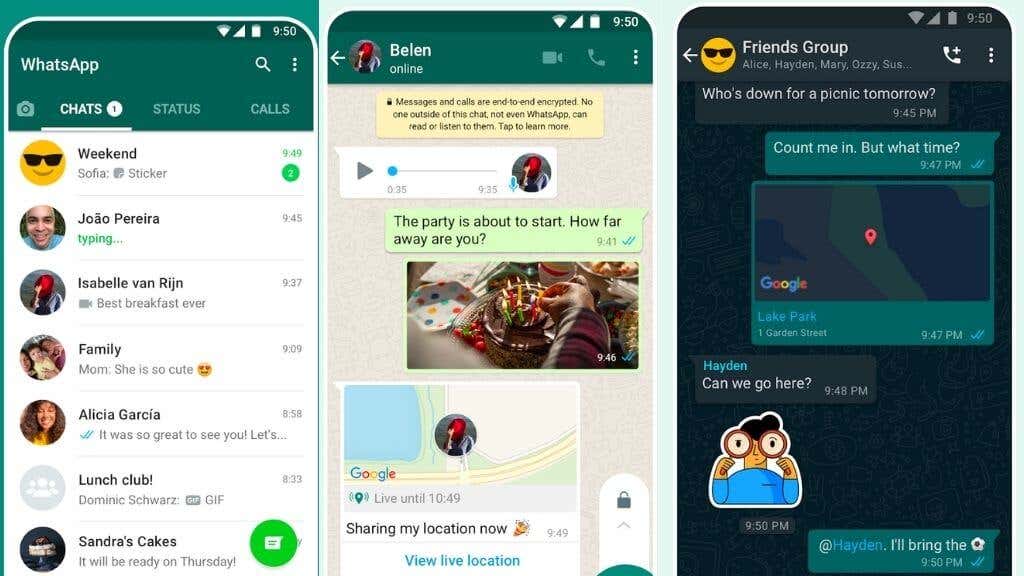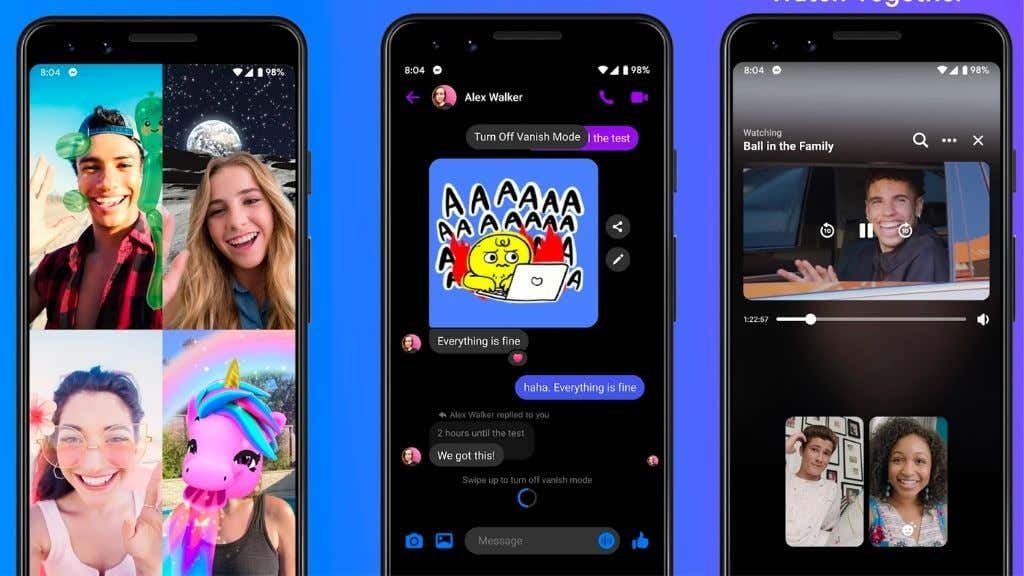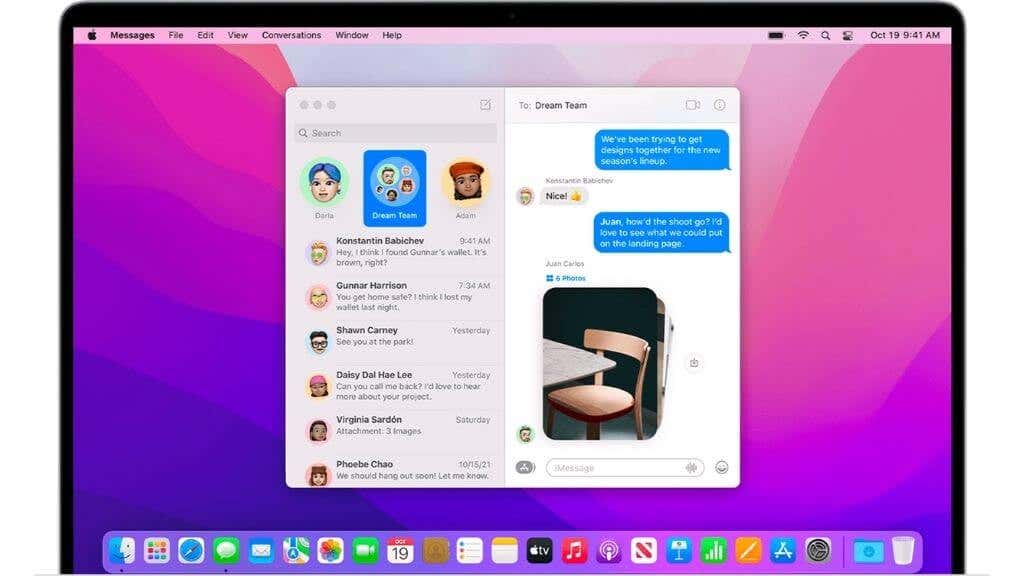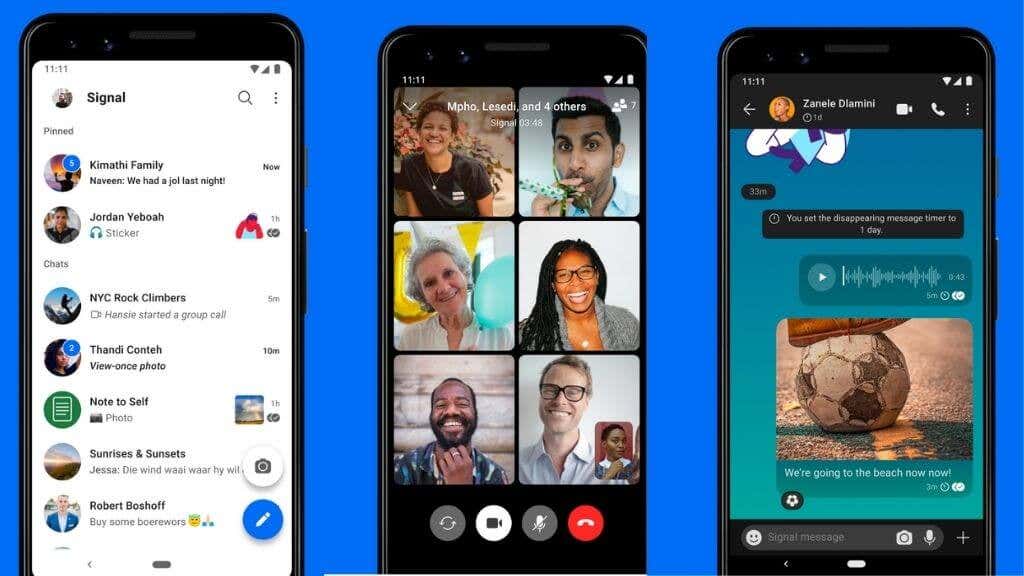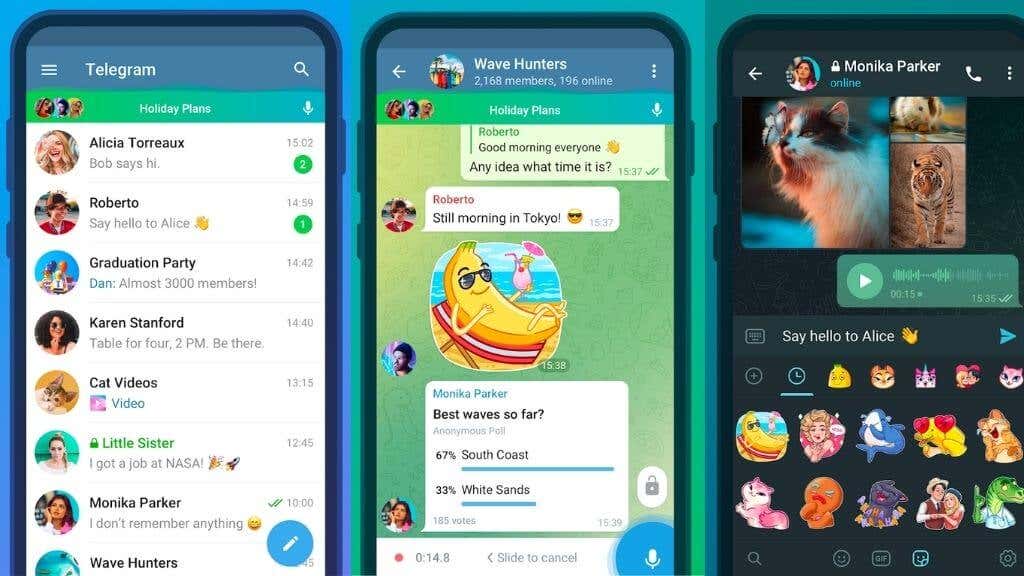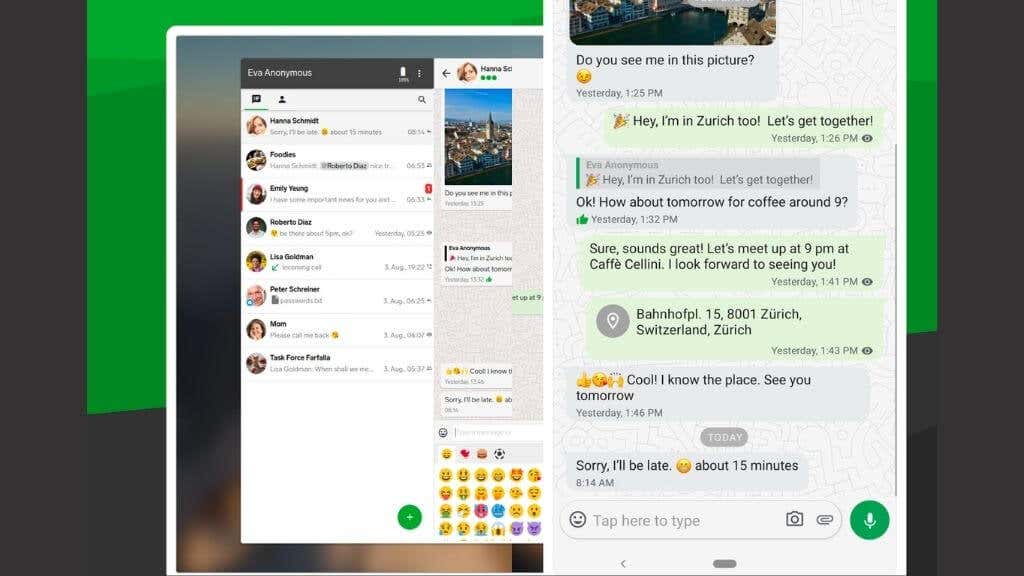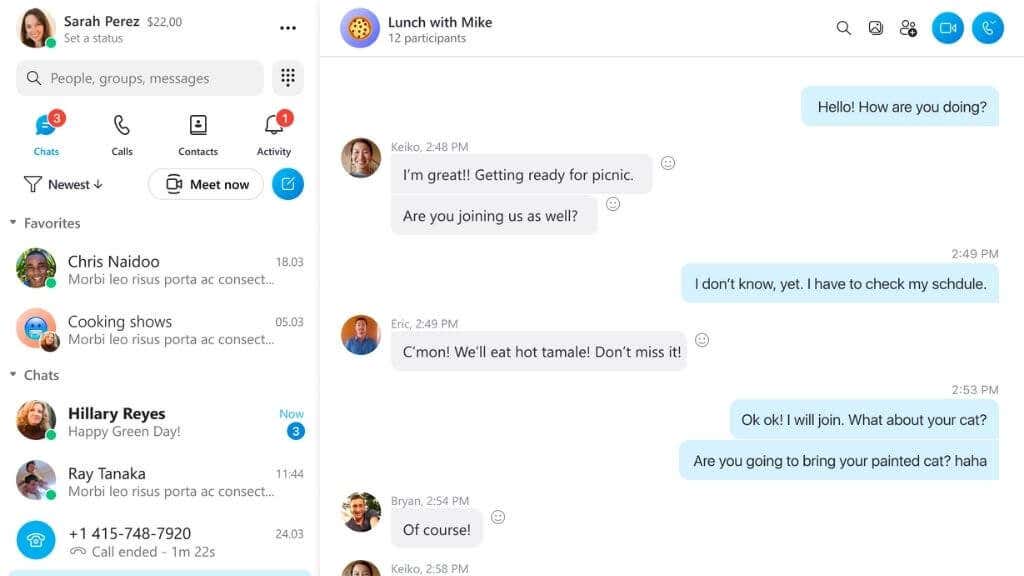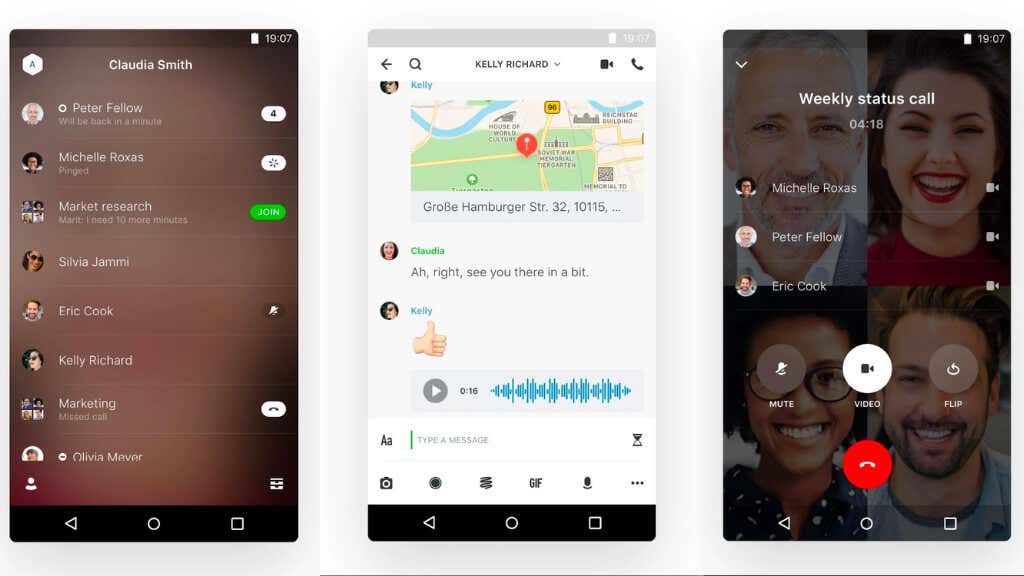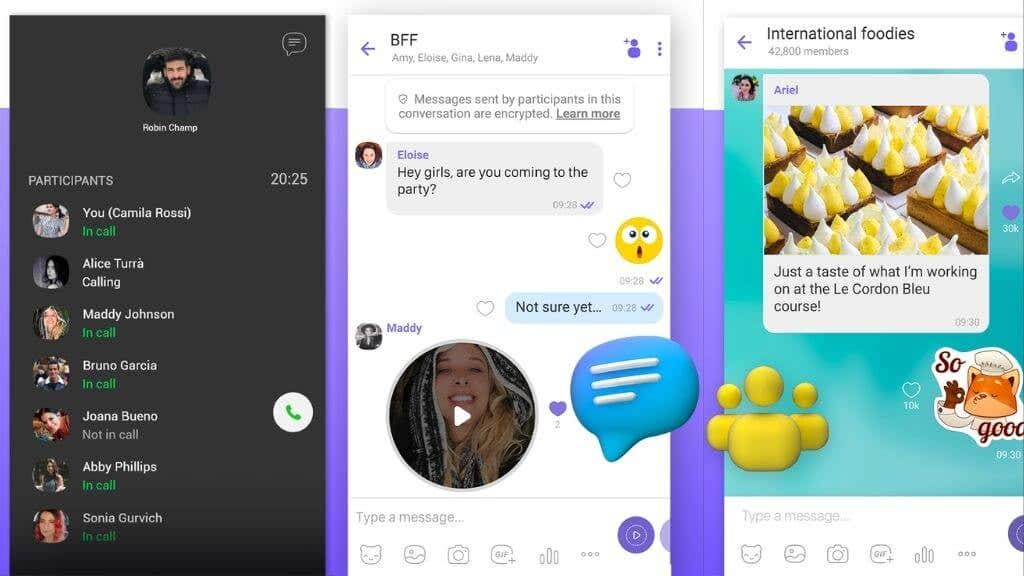Messaging apps have become a crucial form of communication for billions of people worldwide. They’re used in casual discussions about grocery shopping to highly-private information about our personal lives. If you’re looking for a chat app that offers the most privacy, this list of the best chat apps for privacy and security should help you find the right secure app for your needs.
What Makes a Chat App Private and Secure?
There’s no such thing as perfect cybersecurity. Most locks can be broken with enough time, money, and technological advancement. So when we talk about something “secure,” it means that it’s too expensive or difficult to bother trying to crack it. When it comes to chat apps, there are a few aspects of the software that helps to secure your communications. Apps can encrypt your data on the device itself. This is in addition to any device encryption provided by your phone or other devices. Next, if you want to keep things secure, your app should only keep local copies of your data. That means no copies of your actual messages or logs of your activity exist on servers, even if the content is encrypted! You may also want the option for self-destructing messages that are permanently deleted after they’ve been read. Not all apps offer these hardcore security features, but one feature that all secure chat apps should have is end-to-end encryption. This is a method of encrypting your message content where the service provider can’t see what’s being said. The encryption keys are generated on the devices of the chat participants. End-to-end encryption also means that anyone who intercepts your chats won’t be able to read them. You may also want to opt for a chat app that’s open source. This means that anyone can inspect the app’s source code. That makes it almost impossible for “back doors” to be hidden in the code, which would allow the app provider or government officials to bypass the app’s security. What matters the most is choosing the app with the right level of security for your needs.
1. WhatsApp (Android & iOS)
Pros
Almost everyone is on WhatsAppEasy to use, well-designedGreat choice of media sharing optionsEnd-to-end encryption
Cons
Shares data with FaceBook parent companyData collection is linked to your device ID and identity
WhatsApp is the most popular chat app globally and has become so ubiquitous that businesses even list a WhatsApp number on their official pages. WhatsApp is easy to use and incredibly versatile. It offers the expected text chat functionality and a great group chat option for families, organizations, and friend groups. You can share voice messages and use file-sharing features from within the app. Your phone number is your unique link to your WhatsApp profile, and you can make VOIP (voice over IP) calls and video calls from one interface. These encrypted voice calls consume data but not airtime. WhatsApp has strong end-to-end encryption, which means neither WhatsApp nor anyone outside of your chat can know what’s being said. However, there is a catch. Since WhatsApp was acquired by Facebook (now Meta), its privacy policy has changed to allow data harvesting and sharing of WhatsApp users with Facebook. So we can describe WhatsApp as a secure messaging app, but perhaps not the most private one. WhatsApps massive popularity means that you’ll probably have to use it but carefully read through the privacy policy to ensure you’re comfortable with what’s being shared with their corporate overlords.
2. Facebook Messenger (Android & iOS)
Pros
End-to-end Encryption (in Secret Conversations)Optional biometric securityFunky chat environment with lots of hip featuresLarge user base.
Cons
Encryption must be activated for text messages manuallyFacebook data sharing remains a privacy concern.
Sticking with Facebook, for the time being, the next app worth considering is Facebook Messenger. Messenger is the messaging platform used by Facebook, Instagram, and Portal at the time of writing. Oculus Quest will be brought into the fold soon as well. Like WhatsApp, Messenger offers end-to-end encryption. Unlike WhatsApp, you have to activate the feature manually using the “Secret Conversation” option. Voice and video chat are, however, always encrypted. Messenger scores low on privacy for the same reason as WhatsApp. Some of your information is being harvested by the company, and you should read their policies to understand how and why this is being done. It doesn’t score as high as WhatsApp on security either, simply because end-to-end encryption is opt-in at the moment.
3. Apple iMessage (Built-in to iOS & macOS)
Pros
Fantastic integration across your Apple devicesA much more secure alternative to SMS
Cons
iCloud backup introduces encryption vulnerabilitiesYou can only chat with other Apple users
If you own an iPhone, iPad, iPod Touch, or a Mac, you already have iMessage installed on your device. This is Apple’s in-house messaging system, and it’s been wildly popular with Apple customers almost from the start. The big downside of iMessage is that it can only be used between Apple devices since that’s integral to how its end-to-end encryption works. Another possibly serious issue is that the iCloud backup feature for devices like the iPhone stores your device’s encryption key on its servers. That makes it technically possible for someone to decrypt your messages by getting the key from the backup. Luckily you can disable iCloud Backup and wait for the data to be deleted after 180 days, after which the old key will be invalid anyway. That’s only if you’re paranoid, but your in-transit messages are always protected. As a messenger app, iMessage has tons of neat features, such as screen effects for specific messages, stickers, Memoji, Animoji, GIF search integration, and more. As long as everyone you want to talk to is also a part of the Apple fan club, iMessage remains a fantastic chat app.
4. Signal Private Messenger (Android & iOS)
Pros
Highly-secureNo corporate interestOpen source code
Cons
Not as polished as mainstream mega chat appsNetwork performance isn’t always great
When people think of encrypted messaging apps, Signal is undoubtedly one of the first names that pop up. That’s because this app is firmly centered around privacy and security. It’s the app that Edward Snowden uses! Signal can send one-to-one messages, group messages, share files, share voice notes, images, videos, and make video and voice calls. It’s a full-featured chat app with hardcore encryption and privacy standards. The downside of Signal is that some users complain that messages take a long time to send and that server performance isn’t always excellent.
5. Telegram (Android & iOS)
Pros
Better privacy policy than WhatsApp or Facebook MessengerGreat features, such as uncompressed image sharingAll messages are encrypted in transit
Cons
End-to-end encryption needs manual activation
If Signal is the hardcore privacy messaging service, Telegram would be medium-core. It’s more privacy-focused than WhatsApp but not as uncompromising as Signal. On balance, this is the app that we like using as a good middle-ground between the two ends of the secure instant messaging world. One area where Telegram does come short compared to WhatsApp is in the end-to-end encryption department. While all Telegram messages are encrypted, only “Secret Chats” are encrypted end-to-end. In this way, Telegram is like Facebook Messenger. If you remember to mark sensitive chats as secret chats, you’ll get the best of both worlds. Your privacy won’t be as open to corporate greed compared to social media messaging apps. Telegram also has a great Windows and macOS client that does a better job than the WhatsApp desktop client, in our opinion.
6. Wickr Me (Android & iOS)
Pros
Independently auditedStrong encryption practicesAllows for forward-security in case your keys are stolen
Cons
Closed sourceThe CIA is an investor
Wickr was founded back in 2012 and is a pioneer when it comes to secure messaging apps, long before it was cool or topical. One of its key features at launch on iOS was the ability to set an expiration date, superficially similar to the (slightly older) Snapchat, which deletes messages after a day. The EFF (Electronic Frontier Foundation) scored Wickr highly in 2015 for its encryption practices, the ability to secure past communication if your keys were stolen. Wickr’s weak spots come down to being closed source and being a little vague in its technical documentation. However, Wickr has not released a white paper detailing its encryption protocol. What might be slightly worrying is that the CIA is an investor in the company.
7. Threema (Android & iOS)
Pros
Open-sourceBuilt from the ground up to be private and anonymousSwiss servers are legally protected
Cons
It’s not freeLimited user base
Threema stands out from the crowd by being one of the few messaging apps that costs money. It’s only $3.99 to get the app, but that’s steep in the world of mobile apps. The app itself is open-source, which is a security plus point. The money you pay is another assurance that your data isn’t being sold since you are funding the service directly. Threema is based on “privacy by design” principles. One example is that you don’t need to provide a phone number or some other identifiable information like WhatsApp or Telegram. Threema’s servers are in Switzerland, which means that your data benefits from that country’s strict privacy laws. Essentially Threema will never have to provide user information to foreign governments for any reason.
8. Skype (Android & iOS)
Pros
Great performance and featuresMassive user baseAvailable on almost every platform
Cons
Slowly being phased out in favor of Microsoft TeamsEnd-to-end encryption requires manual activation
Skype is another mega-popular chat application backed by a major software company in the form of Microsoft. The software has been around for years, and at this point, it’s pretty stuffed with features, including the ability to make phone calls to regular phone numbers. For a price, of course! Just choose someone from your contact list, pick your mode of communication and start chatting away. Skype has excellent integration with other Microsoft products, but lately, Microsoft has been giving more attention to its Teams platform, which contains Skype DNA. So as time goes by, Skype might start languishing on the back-burner. You should also know that although everything is encrypted, you’ll have to create a private chat manually if you want end-to-end encryption.
9. Wire (Android & iOS)
Pros
Open-source privacy app with great encryption technologyLauded for ease of use
Cons
Now based in the USAKeeps more than the average data on users
Wire is a private messaging app marketed as a secure communication platform before anything else. It’s notable for being available on Linux in addition to the major mobile operating systems, Windows, macOS, and web browsers. Wire lets you chat securely in groups as well as individually. It uses end-to-end encryption based on the Signal protocol. Wire started with its source code closed off, but the code has been open-sourced over time. Wire has won awards for ease of use and security, but there have been some concerns in recent years. The company moved from Luxembourg to the USA, which has raised concerns about privacy law changes when it comes to user data. It’s also become apparent that Wire keeps records on users, ostensibly to help with multi-device syncing. For now, Wire is still considered one of the heavy-hitter private messaging apps, and there’s no indication that users should avoid it. Still, given the business changes that are going on, we advise keeping an eye on any privacy policy changes.
10. Viber (Android & iOS)
Pros
Fast, great usabilityCompetent security
Cons
End-to-end encryption only for single chats
Viber is another messenger app that adds Linux to its list of compatible operating systems. Regarding privacy and security, it’s at the weaker end of the selection here, but the app does offer end-to-end encryption for one-on-one chats. Its safety has been audited externally by Ernst & Young. Although its encryption protocol hasn’t been published in detail, the company has described it using the same concepts as the Signal Protocol. While this company’s security is only in the middle of the pack, Viber users seem to love the software. It’s by far the most popular app of its kind in Ukraine. With nearly 16 million downloads in the Google Play Store alone, there’s something to this funky chat app.
Let’s Have a Private Chat
That’s our list of the best secure messaging apps, but it’s hardly exhaustive. As privacy becomes an even hotter topic of discussion, you can expect the App Store and Play Store to accumulate more and more apps focused on keeping your chats private. Our mobile devices are now such a central part of our lives that you’ll have to make some sort of choice when it comes to private and secure messaging. Assess your risk appetite, decide how much data you’re willing to share with corporations, and then pick the app with the best match to your preferences. As Gandalf said, “Keep it secret, keep it safe!”.
